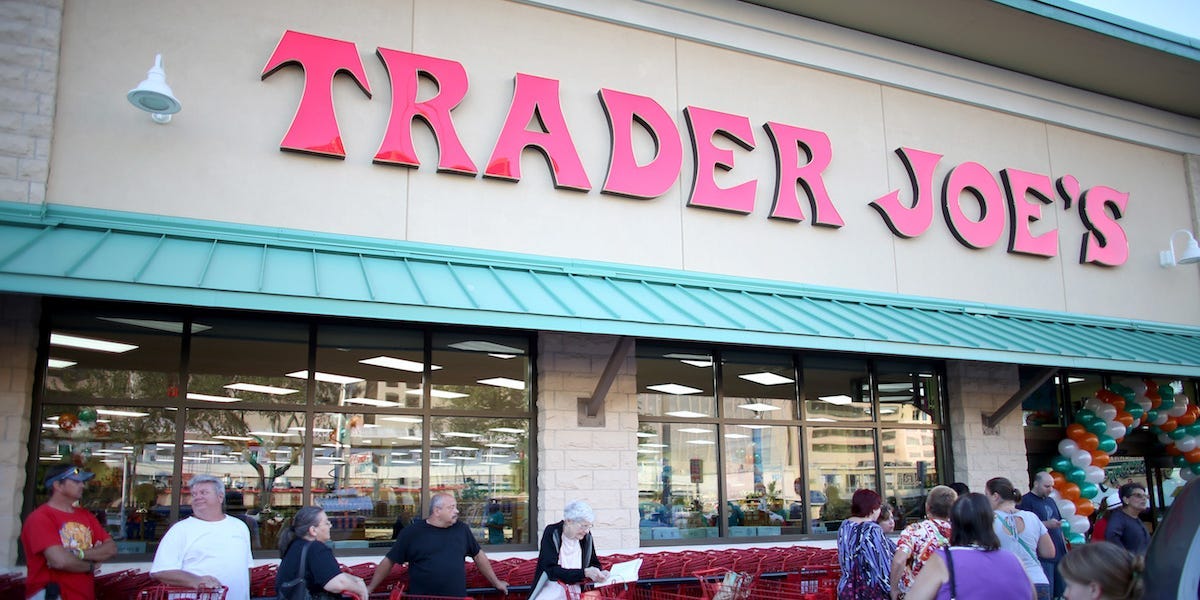- Insider spoke to current and ex Trader Joe’s employees about the slang terms used to do their jobs.
- One employee said they yell “two bells” to respond to coworkers who need help at the register.
- An ex employee said her store would call items that are no longer available for order “capped out.”
Trader Joe’s has a cult following, with a podcast, a widely read newsletter, and a flurry of social media fan accounts. What started as a chain of local convenience stores in 1958, known as Pronto Markets, transformed into a tiki and sea-faring-themed grocery store.
Part of the brand’s secret sauce is its jovial and ready-to-assist employees, who are often a tight-knit crew with their own lingo. This terminology allows for bonding and easy communication.
Insider spoke to current and former Trader Joe’s employees who shared some of these slang terms and their definitions. Here’s what they had to say.
1. Mates and merchants
Instead of calling their workers employees, Trader Joe’s has nautical titles for positions. crew members are entry-level workers. Merchants are crew members who’ve received recognition for stellar customer service. Mates are the assistant managers, and captains are store leaders or managers — promoted from within the company.
You can tell different employee ranks by their vibrant shirts. Crew members wear single-color t-shirts with a flower on the back, while captains wear buttoned shirts with Hawaiian prints.
2. Two Bells
If you’re a Trader Joe’s regular, you’ve undoubtedly heard intermittent bells rung by cashiers during your shopping excursion, but did you know the meanings behind each golden bell sequence?
A current Trader Joe’s employee in Little Rock, Arkansas, who’d like to remain anonymous, shared with Insider that crew members use bells to ask for help.
One bell is a signal to open up another register, two calls for general support, such as replacing a damaged product at checkout, and three rings is a call for manager assistance.
“If we heard two bells, we would race to the front of the store yelling ‘two bells’ to respond immediately,” shared an anonymous crew member in Houston, Texas.
3. Opportunity buy
If you see something labeled “opportunity buy” at your favorite Trader Joe’s, scoop it up ASAP because there’s a limited supply.
“An opportunity buy is when the company finds a really good deal, often for a product we don’t normally carry, so it just appears for a short time,” the Houston employee explained.
Perhaps a supplier offered an unbeatable deal, or a farmer had a temporary surplus of product.
4. Captain’s log
The captain’s log is used daily to improve communication and give specific shout-outs to the crew.
“Every day, the opening or closing crew goes through the captain’s log booklet, which includes announcements, store hours, or if a popular item was out of stock,” said Gabrielle Rojas, a former Trader Joe’s crew member. “If a customer said something especially nice about a crew member, it would also be recorded in the captain’s log.”
5. Capped out
Suppliers may have manufacturing delays or a bad growing season, leading to what’s known inside the company as an order cap.
An order cap means the store can only order a fixed amount of certain products daily and also ensures all stores have a chance to stock seasonal or limited items. Some stores will also set a buying limit so these items aren’t hoarded by customers.”We’d say ‘it’s capped out,’ meaning you can’t order anymore,” said Rojas.
6. The grand finale
Trader Joe’s considers the checkout registers “the grand finale” or the last opportunity to make a wow impression on the customer.
According to the Houston crew member, it’s why checkout employees often comment on how much they love a product in your cart and keep an employee on call to grab last-minute, forgotten, or replacement items.
7. Gangway factor
Trader Joe’s is the opposite of the typical sprawling grocery store, meaning if a product isn’t flying off the shelves, it’s quickly replaced to make room for newer products. According to the Little Rock employee, “Gangway factor means we are constantly making room for new products, trading out limited buy items (one-off products), seasonal items, and discontinued items.”
Though this isn’t a common term heard on the Trader Joe’s floor, in the nautical world, the gangway is a platform leading in and out of the ship. Applied to Trader Joe’s products, it means that a poorly performing product needs to get out of the way.
Read the full article here





